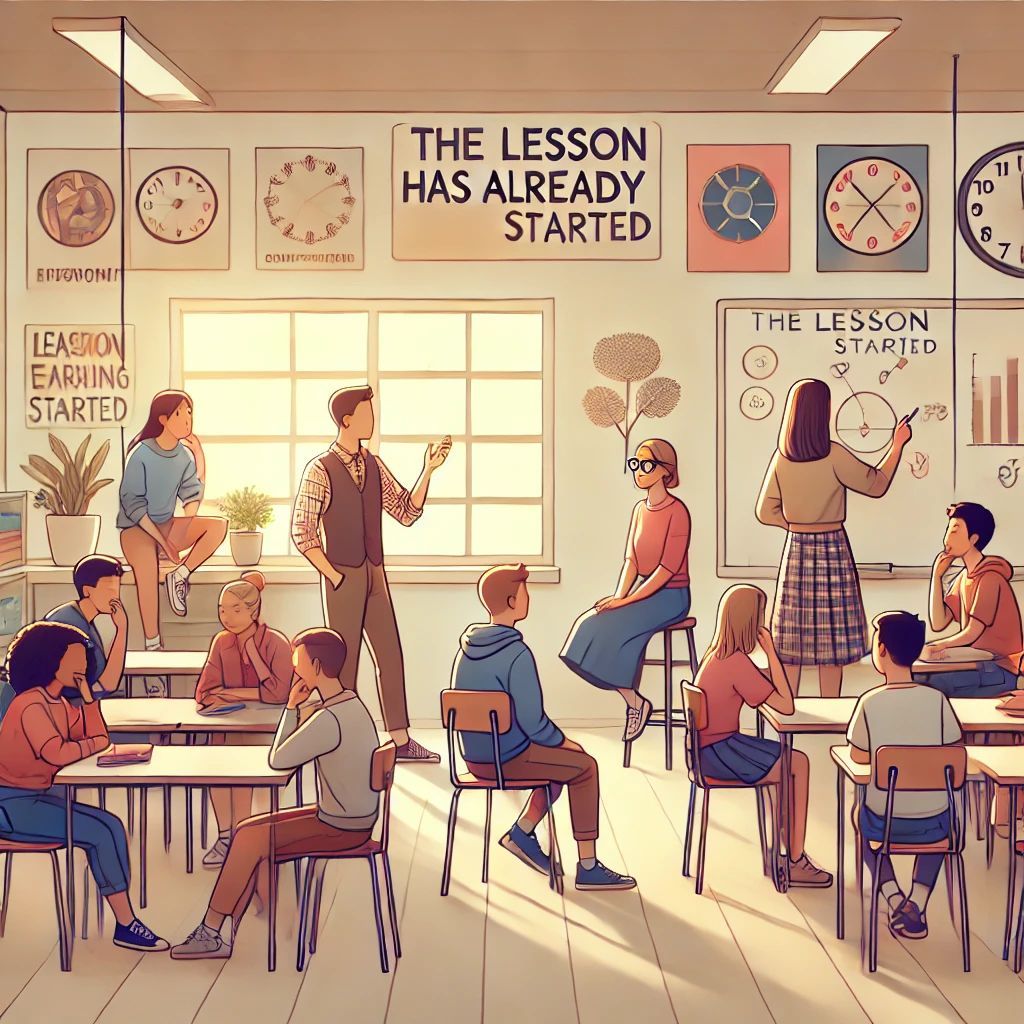Your Teacher Wants To Check In With You - But You . . . .Erm....Think Different!!!

This perception that daily life conversations are outside the scope of lessons can be attributed to several factors, including students' understanding of what constitutes learning, cultural perceptions, their expectations of formal learning environments, and the way that teachers integrate such discussions into the lesson structure. Here are several key considerations:
1. Traditional Conceptions of Learning
- Why do students see daily conversations as separate from formal learning?
- Many students, especially those who have been through formal educational systems, often have a rigid understanding of what constitutes learning. They may perceive learning as structured, textbook-based, or task-oriented, with a clear beginning and end marked by specific activities like exercises, grammar explanations, or reading tasks.
- In this context, casual conversation about daily life, hobbies, or recent experiences can feel less formal and therefore unrelated to "real learning." This is especially true in language learning, where students may be accustomed to focusing on grammar, vocabulary lists, or exam preparation rather than conversational practice.
2. Cultural Expectations of Teacher-Student Interactions
- How do cultural norms shape students' attitudes toward informal discussion?
- Cultural differences in teacher-student interactions can play a significant role in shaping these attitudes. In many cultures, particularly in parts of Asia and other more traditional educational settings, there is a distinct separation between "lesson time" and informal conversation. Learning is expected to be structured and disciplined, with a clear demarcation of when the lesson begins and what activities it involves.
- Teachers are often seen as authoritative figures, leading the lesson with a focus on content delivery rather than on personal interaction. Therefore, students may feel that time spent on small talk or non-academic topics deviates from the purpose of the class and needs to be bracketed out from the formal lesson.
3. Transactional Mindset in Education
- Why do students treat lessons as transactions?
- When students pay for lessons, especially in private tutoring or language learning settings, they may adopt a transactional mindset, viewing the lesson as a product or service that needs to meet their academic needs. They expect to receive something tangible in exchange for their payment, such as vocabulary acquisition, grammar drills, or test strategies.
- This mindset leads students to believe that time spent on conversation is not necessarily time well spent, even though such conversations can be crucial for developing fluency, building rapport, and increasing comfort with language use. As a result, students may not initially see the value in these interactions and may want to move quickly to more tangible learning activities.
4. Misalignment in Understanding the Pedagogical Value of Conversation
- Why do students undervalue conversations in language learning?
- Many students do not immediately recognise the pedagogical benefits of informal conversation, such as its role in improving listening comprehension, spontaneous language use, cultural understanding, and fluency. They may view this type of communication as "off-task" rather than as an integral part of the learning process.
- For teachers, discussing everyday topics can be a strategic approach to getting students to use language naturally, think critically, and express themselves without the pressure of formal tasks. However, without this understanding, students might see the beginning of the lesson as delayed until they are actively engaged in structured activities.
5. Differing Expectations of Lesson Structure
- How do different expectations of lesson flow create misunderstanding?
- Teachers might start a lesson with small talk or open-ended questions as a way to build rapport, ease into more challenging topics, or warm up the student’s conversational skills. This can be a way to assess the student’s comfort level, mood, or even their speaking abilities on that particular day.
- However, students may see this initial time as a warm-up rather than the actual start of the lesson. If they have been conditioned to think that learning begins only when an exercise is introduced, they might not see these conversations as valuable, prompting comments like "can we start the lesson now?"
6. Impatience to Achieve Specific Learning Outcomes
- Why do students prioritise structured activities over open dialogue?
- Some students may feel a sense of urgency or pressure to achieve certain learning outcomes, especially if they are preparing for an exam or trying to meet specific language goals. This can make them impatient with what they perceive as digressions, such as conversations about daily life, and more eager to dive into structured, outcome-oriented activities.
- They may also fear that informal conversation won't directly help them achieve their objectives, such as improving test scores or mastering a particular grammar point, despite the fact that language acquisition benefits greatly from authentic communication.
7. Perceived Inefficiency of Conversational Time
- Why might students perceive conversation as inefficient use of lesson time?
- Students often equate efficiency with productivity, believing that language drills, reading exercises, and explicit grammar instruction are more efficient uses of time compared to free conversation. This perception can be especially strong among students who have limited time and want to maximise every minute of their lessons.
- They may fail to recognise that casual conversation can lead to a more comfortable and immersive learning environment, allowing for natural language acquisition through context, error correction, and real-life application of vocabulary and structures. Without this understanding, they might see conversation as a delay rather than as a part of their language learning journey.
Summary
This issue reflects a deeper disconnect between the teacher’s understanding of learning as a holistic process and the student’s desire for more tangible, structured, and immediate progress. Addressing this discrepancy requires clear communication with students about the value of informal conversation in language learning, emphasising how it builds fluency, cultural awareness, and confidence. It can be helpful to explicitly integrate these conversations into lesson plans as “conversational practice” or “oral warm-up,” framing them as an essential part of the lesson to align both the teacher’s and the student’s expectations.
Incorporating these insights into lesson planning and communication with students can foster a better understanding of the integral role that informal conversations play in their broader educational development.














































































































